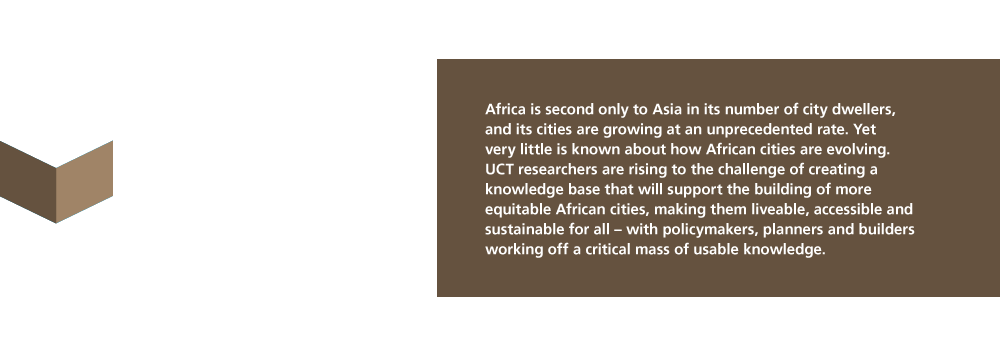Africa’s cities
Crying out for reimagination
Stereotyping would have you believe that Africa is a mass of undeveloped land where poverty rules. But the reality is something quite different. At present, the African continent is 40% urbanised. There are currently 414 million urban dwellers – and only Asia has more city-based people. The continent’s largest cities all have populations of more than a million people.
Moreover, the continent is developing at an unprecedented rate: the United Nations Department of Economic and Social Affairs (UNDESA) predicts that Africa will be 50% urban by 2030 and 60% urban by 2050.
The implications for both city dwellers and policymakers are staggering. In the words of Professor Edgar Pieterse, director of the African Centre for Cities (ACC) and DST/NRF SARCHI Chair in Urban Policy, an interdisciplinary research and teaching programme at UCT, “The mind boggles, and it’s impossible to wrap one’s head around what that might mean in terms of the speed at which you build cities and the speed at which you need to provide services, what that could possibly mean for governance, how citizenship is instituted, and the overlay of that; the tumult of the post-colonial era in the last 50 years and what that has meant for the economic insertion of these countries into the global economy.”
 Urban population growth in Africa is taking place at such a rate that – if there is not an adequate understanding of the situation, and if solutions are not developed quickly – the continent is heading towards a crisis of poverty, inequality and lack of resources for its city people, warns Professor Pieterse.
Urban population growth in Africa is taking place at such a rate that – if there is not an adequate understanding of the situation, and if solutions are not developed quickly – the continent is heading towards a crisis of poverty, inequality and lack of resources for its city people, warns Professor Pieterse.
To put the current situation in perspective, UCT research estimates that the middle-class population of South Africa is expected to double by 2050 and the population of informal dwellers to treble. Only three percent of urban dwellers are eligible for a mortgage and only 28% have stable jobs (including minimum-wage employees). Sixty-three percent are in vulnerable jobs, ie sources of income they could lose at any time.
The implication is therefore that urban planners have to build infrastructure that is desperately needed, but that might fall apart at any time because tax bases might not be maintained. In a nutshell, the number of urban dwellers is increasing dramatically, and economic development is not always keeping up. In many cases, there is in fact economic stagnation and contraction, yet city populations continue to expand and there are increasing demands on resources and expectations of economic opportunity.
The need for knowledge
Understanding what is driving this growth is becoming a key concern for researchers. While migration is a factor in the growth of these cities, it is not the primary factor – and more than one scholar has pointed out that migration is not, in fact, as dramatic an influence as has been previously believed, so attempts to stem the tide of migration are not addressing the problem.
the continent is heading towards a crisis of poverty, inequality and lack of resources for its city people.
Professor Pieterse, together with the University of Bristol’s Dr Sean Fox, a contributor to Professor Pieterse and Professor Sue Parnell’s recent edited volume Africa’s Urban Revolution, argues that cities are actually expanding from within, owing to a decrease in mortality rates and an increase in fertility. Furthermore, rural development can actually increase, rather than decrease, the movement towards cities: people who migrate to cities tend to be young, healthy and aspirational, so improving conditions rurally and providing hope and education are likely, in fact, to create more of the kinds of individuals who are likely to move rather than stay where they are.
Furthermore, Africa has been identified globally as a potential growth market, which is encouraging the pattern of development even further. However, because cities are growing so rapidly, often they – and their structures – are not fully understood. In this environment, it is becoming crucial to build a knowledge base that interrogates the patterns, structures and likely outcomes of Africa’s new urban centres.
Many scholars have pointed out the necessity of increasing the knowledge base surrounding Africa’s cities. “Bad theory leads to bad policy,” as Dr Fox puts it. Professor Parnell, an urban geographer in the Department of Environmental and Geographical Science, explains how the dearth of data on African urbanisation – ranging from a lack of historical understanding to a basic lack of practical information, such as maps and censuses – can lead to poor policymaking. “We have not given adequate cognisance [to this area] … Africans themselves have ignored the urban revolution,” she says.
Professor Parnell further points out that there is a critical lack of understanding of African economics. “We don’t understand the informal sector, so we stereotype,” she says. “We don’t understand Africa’s urban labour market very well.” There is also a tendency to inflate increases in wealth, because it is coming off such a low base, and there is a lack of knowledge about where to invest, she says. In this respect, however, corporates understand what academics have missed: the numbers, although they may be inaccurate, are “sufficiently large to be important”, and the economic future is, as Professor Parnell puts it, “opportunely urban”. Now the challenge is to understand how to leverage that.
The solution, believes Professor Pieterse, is a paradigm shift to a truly democratic urban environment, where people’s needs inform engineering plans instead of the other way around. But it is easier said than done, and the need for scholarly input is enormous.
Getting beyond the stereotypes
One of the major challenges facing African urbanisation today is an anti-urban bias, believes Professor Parnell. “Ninety percent of the funding (from donors) will go to rural development,” she says. “This speaks of a definite anti-urban bias.” However, through the painstaking work of scholars and academics, attitudes and thought patterns are slowly changing.
Scholarship is also doing its bit in carving out a spot for Africa in what Professor Parnell calls the “international imagination” where, she believes, Africa has traditionally been sorely underrepresented. There is simply a lack of current understanding of Africa, says Professor Parnell, so “we need detailed, comprehensive histories”. Most importantly, we need this information for individual cities, because Africa is not a country. “We need to be careful that we don’t generalise about ‘the African city’.”
One of the major generalisations that have to be overcome is the belief that the African city is a slum city. This stereotype is an unhelpful designation. While there is poverty, and most Africans do not have a mortgage, many are, in fact, building themselves up slowly: there is a youth bulge, and rapid development. We may look back on this time very differently in decades to come.
liveable cities
However, Professor Parnell warns that the crucial time is now: without access to basic services and unless it is ensured that individuals’ building methods on their homes enable upgrading, waste removal and sanitation for public health purposes, then slums will eventually develop. Again, she points out the need for engagement with a suitable knowledge base in order to ensure that livable cities are being constructed over time. “To assume planners can do everything on their own is deeply problematic,” she says.
Furthermore, there is a critical need to engage African cities with the global challenges of climate and environmental change. For instance, urban areas are where people are most dependent on, for example, dammed water, and disease profiles in cities are shifting because of temperature change.
The solution is a paradigm shift to a truly democratic urban environment, where people’s needs inform engineering plans instead of the other way around.
The challenge, of course, is to make this workable for all: for instance, Cape Town’s Green Point Common or the Promenade are attractive urban spaces, but they fail at being democratic because they are largely inaccessible to a large percentage of the population owing to distance and transport limitations.
A further complication is that of polylocality. There are many circular migrants in cities: people who extract what they need from the city economically, but invest elsewhere; or, to put it another way, they inhabit the city for working purposes but live, or set root, somewhere else, developing a split identity. This naturally has implications on housing policy and the broader economy. How are city planners and policymakers to tackle this when it is not a pattern that is yet fully understood? The answer, once again, lies in developing a deeper understanding of these fast-developing patterns. There is little time to be lost in getting to grips with Africa’s urbanisation process, particularly in breaking through stereotypes and establishing a high standard of scholarship in this rapidly developing field.
And develop it has to. “There is not enough potential in rural development,” says Professor Parnell. “There is a lightness and optimism associated with the urban future, and I subscribe to that.”
One of ACC’s flagship projects is the innovative Sustainable Human Settlements CityLabs, which are a forum for the co-production of knowledge between academics, practitioners and civil society. Over the past 18 months, academics and practitioners have engaged in the eight active CityLabs focusing on Central City, Philippi, Urban Ecology, Urban Flooding, Human Settlements, Healthy Cities, Alcohol and Public Culture and Urban Violence.
informal settlement upgrading has the potential to address a range of basic needs of urban residents and increase their participation in urban decision-making processes.
During 2013, the CityLabs, in collaboration with the Isandla Institute, brought together researchers and practitioners to document and explore good practice in the upgrading of informal settlements. The lessons from several such interactions (or co-productions of knowledge) are being developed into a book on informal settlement upgrading in South Africa.
The research shows that informal settlement upgrading has the potential to address a range of basic needs of urban residents and increase their participation in urban decision-making processes. This is most likely to happen if upgrading projects are linked into broader urban development processes and form part of city-wide upgrading strategies.
Investing in capacity development
Without strong local government, properly capacitated, the future of cities is in jeopardy. Professor Gordon Pirie, deputy director of the ACC, identifies a number of crises around city planning and the urgent need to begin teaching and writing about cities differently. One of these is a serious shortage of a professional cohort of city officials and technical experts, especially those trained to comprehend and deal with every aspect of hugely complex cities (in resource-constrained contexts), including finance, engineering, services and environment. Another is a shortage of urban professionals and practitioners (not just city planners); yet others are outdated urban training courses and outmoded public thinking and debate about cities.
All of these issues can, of course, be challenged, but it takes time and different ways of thinking. Among its many activities to redress this, the ACC runs an MPhil course directed at mid-career professionals interested in thinking differently about cities and upgrading their skills, ensuring that those in the field already can maintain freshness of thinking. It has also raised funds for the past three years to exchange doctoral students and Cape Town City officials in placements that are cross-fertilising ideas and action specifically in the areas of green economy, energy, climate change and the built environment, thereby ensuring that there is not a limiting gap between academics and practitioners.
Empowering citizens
However, even if the state were better capacitated, it could not, on its own, solve the problems presented by rapid urban development. Massive systemic reform is needed when it comes to making cities livable for all, says Professor Pirie. Specifically, it is through allowing widespread agency that the inequality gap can be tackled, and acceptable urban dwellings and facilities can be made for all. “It is not just a case of bypassing, but also of reforming the state to ensure an appropriate legal regime that has legitimacy when it is enforced,” says Professor Parnell, a founding member of the ACC and member of its executive committee. “Across Africa there is an urgent need to empower residents and NGOs themselves to take charge – not just of building, upgrading or formalising the informal, but of processes that can help to create change.
“Citizens can be empowered to make representations, to debate and challenge local government, and to monitor inactivity, servicing and billing. Recourse to privatisation is not an option for poor people in cities.”
To this end, the ACC aims to improve the level of public discourse – not only through the channels of open talks and public media, but also through a series of public-facing exhibitions that will take place in Cape Town throughout 2014.
“We want to invite other scholars and the public to engage with us to build some sort of critical mass [of knowledge] around this discourse,” says Professor Pieterse. Professor Pirie agrees: “The ACC’s purpose is to get people thinking imaginatively and progressively about cities. Often, African cities are seen as just too bewildering.”
But, bewildering or not, as professors Parnell and Pieterse put it in Africa’s Urban Revolution, “increasing levels of urbanisation are probably inevitable and must be confronted”. There is no escaping the reality of Africa’s rapidly growing cities, or the fact that development is not always occurring at the same rate. To prevent gross inequalities from being perpetuated, it is critical to have scholars, practitioners and the public working together to re-imagine the construction – and ongoing development – of Africa’s cities. UCT’s scholars are working overtime on a viable starting point.




